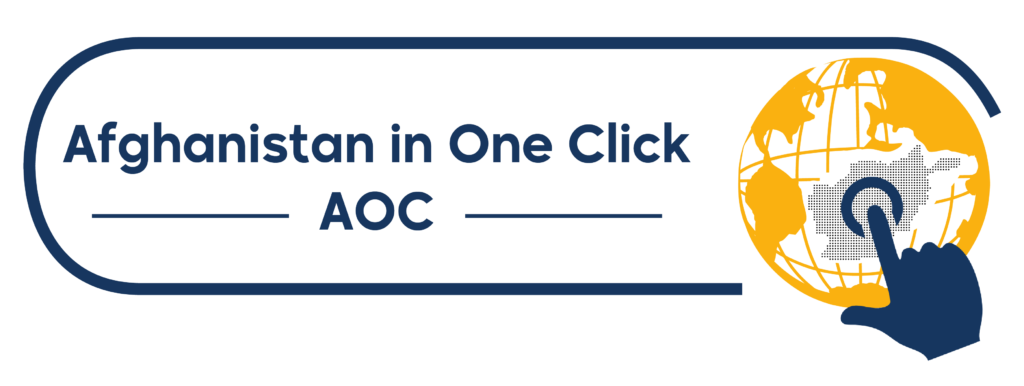New Academic Year Begins with Schools Still Closed to Girls
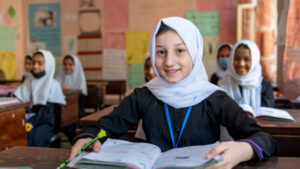 On the first day of the new year, the gates of schools in all the cold provinces of the country have opened.
On the first day of the new year, the gates of schools in all the cold provinces of the country have opened.
With the start of the new academic year, thousands of children are stepping into schools for the first time.
Rahmatullah Jaber, the head of education in Herat, said: “Almost one hundred thousand and seven hundred new students have been enrolled in schools.”
Rahim Gul Ahmadi, an official of Kunduz education department, said: “This new year, we have enrolled eighteen thousand and 362 students, God willing, the number is large this year, and the enthusiasm and interest of people in science and knowledge are great.”
In the new year, with schools remaining closed to girls above grade six, it has once again caused disappointment for these girls and their families.
Mona Sadat, a student, said: “We were hopeful that the gates of schools would open to girls again; but this year, the school bell rang without the presence of girls, there was not a single girl.”
Lailuma Hamidi, a resident of Herat, said: “The issue of starting girls’ schools from seventh to twelfth grade has turned into a dream that every woman and man in Afghanistan wishes for girls to go back to school and engage in education and training.”
Shamsullah, a religious scholar, said: “The gates of schools, universities, and madrasas should be opened for everyone whether it is a girl or a boy.”
Some local officials of the caretaker government in the provinces consider the acquisition of contemporary knowledge a serious need in the country.
Noor Ahmad Islamjar, the governor of Herat, said: “We need to reach technology and progress so that we can have everything like other countries – medicine, doctors, cars, weapons, etc., and this is possible through modern sciences.”
Abdul Ali Qudratullah Amini, the governor of Parwan, said: “This misery can be eradicated from the land through education, science, culture, and knowledge.”
The new academic year has commenced, yet girl students above six grade across the country have been barred from attending school for over 900 days.
Pakistan Initiates Second Wave of Afghan Migrant Expulsions
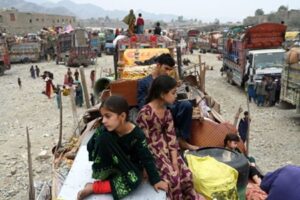 Syed Mohsin Raza Naqvi, the Interior Minister of Pakistan, announces the commencement of the second phase of Afghan migrant expulsions from his country in less than a month.
Syed Mohsin Raza Naqvi, the Interior Minister of Pakistan, announces the commencement of the second phase of Afghan migrant expulsions from his country in less than a month.
Naqvi states that all migrants without legal documentation, including Afghans, must return to their countries.
The Interior Minister of Pakistan said, “Any Afghan or anyone living illegally in Pakistan must be expelled from Pakistan. This does not mean they cannot return to Pakistan, but they can return to this country with legal documentation and visas.”
However, some Afghan migrants in Pakistan criticized the government’s improper treatment, saying that the Pakistani government is also expelling migrants who have legal documentation.
They request the caretaker government to seriously address their challenges in Pakistan.
Zahir Bahand, an Afghan journalist in Pakistan, said: “Currently, hundreds of Afghan refugees are spending time in Pakistani jails due to the lack of sufficient documents, which is considered a great injustice.”
At the same time, the deputy minister of Refugees and Repatriation (MoRR), Abdul Rahman Rashid, asked host countries, including Pakistan, to allow Afghan migrants to voluntarily return to their country.
Rashed said, “Our request from the host countries, especially Pakistan, which has close neighborhood ties and a common border with us, is to refrain from this political pressure and cooperate with us.”
Ali Reza Karimi, an expert on migrant affairs, said: “The main reasons for the deportation of Afghan migrants from Pakistan are hostility, economic crisis, and the souring of relations between the caretaker government and Pakistan.”
This new decision by Pakistani authorities to expel Afghan migrants comes as Pakistan’s bombings on Monday in Afghan territory and clashes between the forces of the caretaker government and Pakistan near the Durand Line have also elicited reactions from some countries and Afghan political figures.
Increase of Child Workers Observed in Kabul During Ramadan
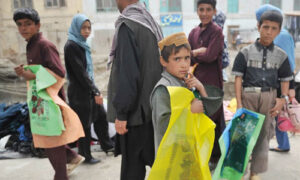 Although child labor in the capital is not new, with the beginning of Ramadan, the number of these children on the roads of Kabul has increased.
Although child labor in the capital is not new, with the beginning of Ramadan, the number of these children on the roads of Kabul has increased.
These children say that they are forced to work hard due to economic challenges.
10-year-old Yahya, who is working in a vehicle workshop, said: “If our country was developed, life would be better and we would study; because of economic challenges we work here to find halal food.”
“I work in a mechanic shop. My father is a cart attendant and he is working in Sara-e- Shamali. I came here to learn something,” Mustafa, another child laborer, told X.
Meanwhile, several residents of Kabul urged the caretaker government to provide education opportunities to these children.
“There are about 40 shops in this area. In each of them two or three children work as a student, they should learn, we want the government to provide educational opportunities to these children,” said Nisar Ahmad, a resident of Kabul.
“In order to prevent and reduce the activities of child labor, apart from financial aid, educational and cultural infrastructure should be considered,” said Asifa Stanikzai, a children rights activist.
Samiullah Ebrahimi, the spokesperson of the Ministry of Labor and Social Affairs, said that this ministry has gathered more than 25,000 child workers and beggars from the city in the past two years, and that their efforts continue in this regard.
“Almost 25,000 children were engaged in child labor and begging– that is why the Ministry of Labor and Social Affairs identified these children and has helped them through the Red Crescent Society,” he said.
Previously, Save the Children reported that child labor in Afghanistan has increased by 38% compared to last year.
Tension between the Taliban and Islamabad following Pakistan's air attack; America demanded to resolve the differences through dialogue
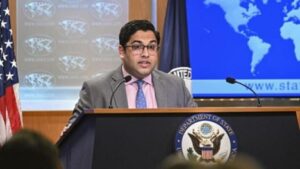 Following the rising tension between Pakistan and the de facto government, the US asked both sides to resolve their differences through dialogue.
Following the rising tension between Pakistan and the de facto government, the US asked both sides to resolve their differences through dialogue.
Yesterday, Pakistan Air Force targeted two points in two provinces of Afghanistan. The Taliban spokesman said that five women and three children were killed in these bombings in Paktika and Khost provinces.
Pakistan, however, called these attacks “anti-terrorist operations”.
Following this attack, the Ministry of Defense of the Taliban announced that in response, it has targeted positions in Pakistan near the border with heavy weapons.
Yesterday evening, Vedan Patel, the Deputy Spokesperson of the US Ministry of Foreign Affairs, expressed concern about these tensions in a press conference and said that in such an operation, it should be ensured that civilians are not harmed.
No Country, Including US, Will Be Threatened from Afghanistan
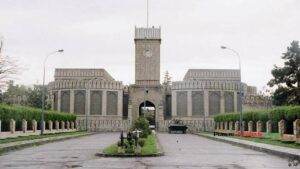 The spokesman for the de facto government, in response to the statements of two American generals speaking to US Representatives, said that Afghan soil will not be used against any country.
The spokesman for the de facto government, in response to the statements of two American generals speaking to US Representatives, said that Afghan soil will not be used against any country.
The spokesman for the caretaker government, responding to the remarks of the former US CENTCOM Commander Gen. Kenneth McKenzie, about harboring certain groups and the potential threat from Afghan soil, said that the caretaker government has not given refuge to any terrorist group.
Mujahid told TOLOnews: “The de facto government of Afghanistan does not allow its territory to be used as a threat against America or any other country, and there are no foreign groups present in Afghanistan that could be considered a threat. Daesh, which was previously here, has been crushed and is in a state of destruction.”
The former CENTCOM commander, speaking at the US House of Representatives Foreign Relations Committee, claimed that “the Taliban” have given refuge to groups attempting to attack the United States and its forces.
The former CENTCOM commander said the United States’ withdrawal was one of the reasons for the fall of the republic system.
Kenneth McKenzie said: “I agree with the chairman that the Taliban is a terrorist organization, they themselves don’t have a desire to attack us in our homeland but they do harbor entities and organizations that do have a desire to do that, and I think right now it’s hard for me to get beyond that relentless focus.”
Gen. Mark Milley, the former chairman of the US Joint Chiefs of Staff, also said in the Foreign Relations Committee of the House of Representatives: “The Afghan government collapsed, the Afghan military collapsed and the special investigating IG estimates $7.2 billion dollars’ worth of US manufactured equipment not US owned equipment ended up in Taliban hands.”
“Now, because of their elections, these are electoral slogans; they compile these in both houses and interrogate, throwing dust in their people’s eyes about how we were defeated,” Kamran Aman, a military analyst, said regarding the American generals’ statements.
Earlier, the US Department of State said that the Doha Agreement led to the empowerment of the de facto government and the weakening of America’s partners in Afghanistan.
Retired generals described the chaos and difficulties of leaving Afghanistan
 Two retired American generals who oversaw the tumultuous withdrawal from Afghanistan in 2021 have testified before the US Congress.
Two retired American generals who oversaw the tumultuous withdrawal from Afghanistan in 2021 have testified before the US Congress.
Mark Milley, the former chairman of the Joint Chiefs of Staff, and Kenneth McKenzie, who served as the US Central Command under him, were testifying for the first time since retirement.
Republican lawmakers blamed US President Joe Biden for the disastrous withdrawal from Afghanistan, and Democrats blamed the Trump administration for making a deal with the Taliban.
But these two generals did not seem to have the desire to justify the theory of any of the two parties.
Instead, they said that both Donald Trump, Joe Biden and previous administrations played a role in that disastrous retreat.
Afghanistan loses 34% of its forests in the last 15 years
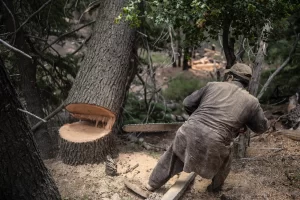 The Food and Agriculture Organization (FAO) of the United Nations says that the wars and crises of the past 40 years have had a very negative impact on forests in Afghanistan.
The Food and Agriculture Organization (FAO) of the United Nations says that the wars and crises of the past 40 years have had a very negative impact on forests in Afghanistan.
On the occasion of March 21, the International Forest Protection Day, FAO said on X on Wednesday that, Afghanistan has 1.78 million hectares of forests and woodlands.
The Food and Agriculture Organization of the United Nations, by publishing an informative video, said that in the last 15 years alone, Afghanistan has lost 34% of its forests.
For many years, arbitrary cutting of forests has continued in Afghanistan and the governments have not been able to stop it.
Since 2013, March 21 has become the International Forest Protection Day so that the people of the world are aware of its importance.
This is despite the fact that two years ago, Zabihullah Mujahid, the spokesman of the de facto government, said in a tweet that according to the decision of the Council of Ministers of the caretaker government of Afghanistan, it is strictly forbidden to cut forests, sell the wood and transport it.
Also, two years ago, the de facto government announced the formation of a unit to protect the forests of Afghanistan.
This unit of 450 people is called “Green Unit” and it was formed in order to prevent illegal cutting of forests and the smuggling of wood.
According to the IEA there are 100 members of this unit in Kabul and 50 people in each of the other seven provinces – Kunar, Nuristan, Khost, Laghman, Paktia, Paktika and Nangarhar – that have forests and woodlands.
Afghan student injured in mob attack over taraweeh at Indian hostel
 Five international students were injured when a mob stormed a Gujarat University hostel in India on Saturday night allegedly over prayers.
Five international students were injured when a mob stormed a Gujarat University hostel in India on Saturday night allegedly over prayers.
India’s State Home Minister Harsh Sanghavi has reportedly spoken to Gujarat’s top police officers and directed them to arrest the accused as soon as possible and to investigate the matter fairly, NDTV reported.
The students had gathered inside the hostel to offer taraweeh, a prayer offered at night during Ramadan, as there is no mosque on campus.
Soon after starting prayers, a mob armed with sticks and knives stormed the hostel, and attacked the students. They also vandalized their rooms.
Students told NDTV the security guard had tried to stop the incident but had not been able to.
A student from Afghanistan said people in the mob shouted slogans and asked them who had granted them permission to offer prayers in the hostel.
“They attacked us inside the rooms too. They broke laptops, phones and damaged bikes,” he said.
The student said the five injured students are from Afghanistan, Sri Lanka and Turkmenistan and two from African countries.
“Police arrived half an hour after the incident. By then, the mob had fled. The injured students are in hospital and have informed their embassies,” the student said.
Visuals shared on social media showed damaged bikes, broken laptops and ravaged rooms. In some of the visuals, people are seen throwing stones at the hostel and hurling abuse at the foreign students. In the visuals, the international students are heard saying that they are “scared” and that “this is unacceptable”.
Indian MP and All India Majlis-e-Ittehadul Muslimeen chief Asaduddin Owaisi has slammed the incident and asked if Prime Minister Narendra Modi and Home Minister Amit Shah will intervene.
“What a shame. When your devotion and religious slogans only come out when Muslims peacefully practice their religion. When you become unexplainably angry at the mere sight of Muslims. What is this, if not mass radicalisation? This is the home state of @AmitShah & @narendramodi, will they intervene to send a strong message? I am not holding my breath. @DrSJaishankar domestic anti-Muslim hatred is destroying India’s goodwill,” he said in a post on X.
This comes after a Washington-based research group said last month that anti-Muslim hate speech in India rose by 62% in the second half of 2023 compared to the first six months of the year.
UNAMA urges IEA to reopen schools for girls
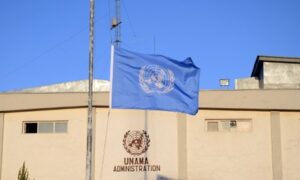 The Office of the United Nations Assistance Mission in Afghanistan (UNAMA) on Wednesday called on the Islamic Emirate to reopen schools and universities to teenage girls and women.
The Office of the United Nations Assistance Mission in Afghanistan (UNAMA) on Wednesday called on the Islamic Emirate to reopen schools and universities to teenage girls and women.
In a post on X, UNAMA pointed out on the day schools reopened for the new year that it has been more than 900 days since girls over the age of twelve have been allowed to attend school and university.
UNAMA has urged the de facto government of Afghanistan to end this “unjustifiable” and “damaging” ban.
“Education for all is essential for peace & prosperity,” UNAMA added.
Three killed, 12 injured in an explosion outside a bank in Kandahar
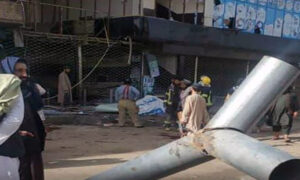 Three people were killed and 12 people were injured in an explosion Thursday morning in front of the Kabul Bank in the District 1 of Kandahar city.
Three people were killed and 12 people were injured in an explosion Thursday morning in front of the Kabul Bank in the District 1 of Kandahar city.
According to Kandahar police the blast occurred when a person detonated his explosives outside the bank.
This blast happened in a civilian place and most of the victims of the incident are civilians, who were later transferred to the hospital, Kandahar’s police said.
Police are investigating the explosion.
Hospital officials have confirmed that the wounded victims are in stable condition.
So far no group or person has claimed responsibility for the blast.
Ashgabat hosts Turkmen-Afghan Business Forum and Expo
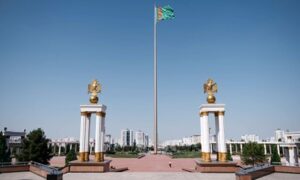 The Turkmen-Afghan Business Forum is currently being held in Ashgabat in Turkmenistan and goods from Afghan manufacturers are being exhibited.
The Turkmen-Afghan Business Forum is currently being held in Ashgabat in Turkmenistan and goods from Afghan manufacturers are being exhibited.
Businessmen from the two countries are holding talks within the framework of the exhibition, Trend news agency reported.
According to Turkmenistan’s Chamber of Commerce and Industry, the exhibition will be of great importance in expanding bilateral trade and economic cooperation between Afghanistan and Turkmenistan, increasing trade turnover, and developing business cooperation with Afghan companies.
World Bank agrees to restart Afghanistan CASA-1000 power project

The World Bank has announced that it has agreed to restart the Central Asia-South Asia Electricity Transmission and Trade Project (CASA-1000) in Afghanistan amid concerns among the other participating countries -Kyrgyzstan, Tajikistan and Pakistan – that they risk $1billion of stranded assets.
However, the WB said the resumption would only take place within a ring-fenced structure that would ensure all construction payments and future revenue are managed outside of Afghanistan and do not involve the caretaker government.
The structure would also mean a strengthened commitment to the use of international consultants to supervise progress and third-party monitoring to verify progress and certify contractor invoices, it said.
The $1.2bn CASA-1000 regional power project is designed to interconnect the power grids of the four participating countries, allowing for hydro power-generated electricity to be exported from the two Central Asian states to Afghanistan and to Pakistan via Afghanistan.
The project was approved by the World Bank board in March 2014 with financing from the International Development Association (IDA), but in Afghanistan it was paused, with all implementation activities stopped, in the wake of the return to power of the Islamic Emirate.
Before the project was paused, about 18% of the towers for the Afghanistan portion of the CASA transmission line had been erected and about 95% of the materials and equipment needed to complete the project in the country had been supplied, according to the World Bank.
Despite the Afghanistan pause, the Kyrgyz Republic, Tajikistan and Pakistan continued with the implementation of CASA-1000 and construction activities are nearly complete in all three countries, it added.
The ring-fenced resumption, said the World Bank, would be in two phases: construction, expected to take three years, and operations after that.
Its statement concluded: “During the project construction phase, the World Bank will make payments directly to the offshore accounts of international contractors and consultants, based on verification of invoices by the independent monitoring agency.
“For the operations phase, Offshore Account Bank (Abu Dhabi) arrangements are in place to ensure that payments and revenue are ring-fenced offshore as per commercial contractual agreements with requirements for no objection for use for specified purposes, including purchase of electricity from Tajikistan and Kyrgyz Republic under the CASA-1000 and other existing power purchase agreements.”
The caretaker government has repeatedly called for the resumption of stalled development projects in the country by international organizations and countries.
The de facto government says that, any project that is implemented in Afghanistan should be done once the caretaker government of Afghanistan has been informed.
The IEA also said Afghanistan’s conditions should be taken into consideration.
“We are ready to cooperate. There is security in Afghanistan and there are facilities to implement the project and the system cooperates in the necessary sectors and will not be an obstacle,” said Zabiullah Mujahid, de facto government’s spokesman.
Afghani up by 15.42% against US dollar year-on-year
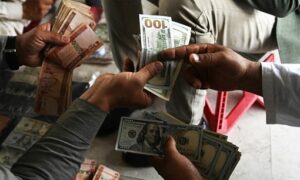 The vice president of Da Afghanistan Bank (Central Bank) said the Afghani (AFN) has strengthened this year by 15.42% against the US dollar.
The vice president of Da Afghanistan Bank (Central Bank) said the Afghani (AFN) has strengthened this year by 15.42% against the US dollar.
Noor Ahmad Agha also said new banknotes have been printed and have been sent to the country.
He added that these banknotes will be put into circulation as needed.
According to him, old banknotes worth 4.7 billion Afghanis have been destroyed in five zones of the country over the past year.
Landmark CASA-1000 Project Implementation Signed
 Officials in the de facto government announced the signing of the implementation of the CASA-1000 project between Kyrgyzstan, Uzbekistan, Afghanistan, and Pakistan.
Officials in the de facto government announced the signing of the implementation of the CASA-1000 project between Kyrgyzstan, Uzbekistan, Afghanistan, and Pakistan.
Zabihullah Mujahid, the caretaker government’s spokesperson, informed X that the practical execution of this project is slated to start in late April. He highlighted that this project would substantially mitigate Afghanistan’s electricity shortfall while generating significant transit revenue for the country.
“After the caretaker government’s concerted efforts, we are set to recommence this project, with practical work kicking off by the end of April. The contract was signed yesterday, with the Breshna Company’s deputy representing Afghanistan,” Mujahid stated.
Hekmatullah Maiwandi, spokesperson for Da Afghanistan Breshna Sherkat (DABS), announced: “The World Bank has green-lit the initiation of this project in Afghanistan, scheduled to start in the month of Saur 1403 of the solar year.”
The Afghanistan Chamber of Commerce and Investment (ACCI) regards the CASA-1000 project’s realization as highly advantageous for the national economy.
“Afghanistan has tirelessly worked towards the fruition of the CASA-1000 project for years. Its implementation is expected not just to create job opportunities but to significantly benefit the country’s economy,” said Mirwais Hotak, head of ACCI’s Executive Board.
Experts also deem the CASA-1000 project crucial for Afghanistan and its Central and South Asian neighbors. They argue that the project’s commencement will elevate Afghanistan’s standing among nations and spur job creation for numerous citizens.
Amanullah Ghalib, former head of Breshna Company, shared that: “About 35 to 40 percent of the project is already underway, with 60 to 70 percent of the work pending in Afghanistan. Both previously contracted companies are prepared to resume their contributions. This venture will not only foster job creation but also bolster Afghanistan’s regional stature.”
Officials confirm that with the resumption of the remaining CASA-1000 project tasks, completion is anticipated within two years, marking a significant step towards energy independence and economic revitalization.
The Caretaker Government Announces Reduction in Customs Tariffs on Raw Materials
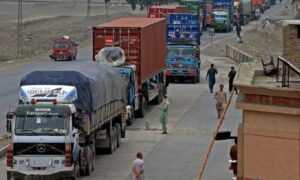 The customs tariff on raw materials was from 1% to 2.5%, but after this, only a 1% customs tariff will be taken from industrialists.
The customs tariff on raw materials was from 1% to 2.5%, but after this, only a 1% customs tariff will be taken from industrialists.
The General Directorate of Customs has reduced the customs tariff on raw materials by 1.5% to support and develop the industry and to facilitate industrialists.
The directorate said in a statement that before, the customs tariff on raw materials was from 1% to 2.5%, but after this, only a 1% customs tariff will be taken from industrialists.
Zabihullah Mujahid, spokesman for the de facto government, said: “One of the problems was the issue of tariffs, which was reduced from 2.5% to 1%, and exemptions are still being made. before, they [Directorate of Customs] had imposed fines and their issues remained unresolved.”
At the same time, the Afghanistan Chamber of Commerce & investment (ACCI) said that currently, more than 6,000 factories are active in the country and import most of their raw materials from other countries.
Officials of the chamber emphasized that in addition to reducing tariffs, attention must also be paid to the challenges of factory owners in the electricity supply sector.
“Industries play an important role in the prosperity of the country, so it is necessary to create facilities for the progress of industries and to work on infrastructure projects for this purpose,” Mohammad Yunus Momand, the first deputy of ACCI, said.
Meanwhile, for the past more than two and a half years, officials of the caretaker government have repeatedly committed to supporting domestic production and have also ordered government agencies to use domestic products.
142 Projects Costing 40 Billion Afs Approved: Officials
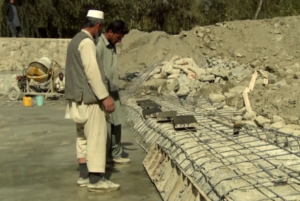 The National Procurement Commission said that 142 projects costing 40 Billion Afs have been granted approval.
The National Procurement Commission said that 142 projects costing 40 Billion Afs have been granted approval.
According to the statement of the National Procurement Commission, domestic products will be prioritized in the implementation of the projects, and thousands of people will be provided with jobs.
The statement said that the approved projects are in the fields of transportation, energy, health, infrastructure, telecommunications, agriculture and rural rehabilitation.
“These important projects are in the field of electricity, health, infrastructure, agriculture, the construction of roads and are also related to extraction, and, Inshallah, it will start soon. After the approval of the procurement commission, Inshallah, the implementation will start soon,” said Zabihullah Mujahid, the spokesman of the caretaker government.
The Ministry of Economy said that since the return of the de facto government, many infrastructural projects have been commenced from the domestic budget in the interest of self-sufficiency.
“After the resumption of the de facto government, major infrastructural projects have been approved and implemented, the main goal is self-sufficiency of the country. These projects have been mainly implemented with the national budget,” said Abdul Latif Nazary, the deputy of the Ministry of Economy.
Some economic experts said that to attract investment in major projects, it is necessary for the caretaker government to have a positive interaction with the world.
“To implement development projects and even semi-complete projects, it requires huge investment, mainly political interactions, both in the region and the world, are necessary,” said Sayed Masoud, an economic expert.
Previously, the Ministry of Economy said that 179 projects costing 27 billion Afghanis, have been implemented in 2023 from the domestic budget.
Ministry of commerce allocates land for oil refineries
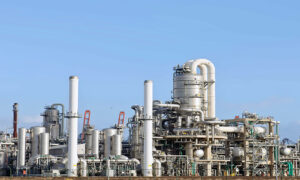 Acting Minister of Industry and Commerce Nooruddin Azizi, said in a meeting with oil refinery officials that as soon as they are ready to invest, the ministry will establish an oil and gas industrial park.
Acting Minister of Industry and Commerce Nooruddin Azizi, said in a meeting with oil refinery officials that as soon as they are ready to invest, the ministry will establish an oil and gas industrial park.
In this meeting, refinery officials discussed problems regarding the Qashqari oil field and agreed that land should be provided. They said oil extracted from Qashqari needed to be refined through the standard process.
Azizi, while announcing the cooperation and support of the de facto government and especially the Ministry of Commerce and Industry for the private sector of the country, said: “A joint proposal should be arranged and submitted to this ministry for the land of the refineries, and also if the officials of the refineries are ready to invest in the area of Dara-e-Hairatan, an oil and gas industrial park will be created and the land will be placed under their control.”
Azizi emphasized the need to increase the capacity of existing refineries and the quality of oil, shared the decision of the High Economic Commission regarding the establishment of a large refinery.
Headline inflation in Afghanistan down to -10.2% in January
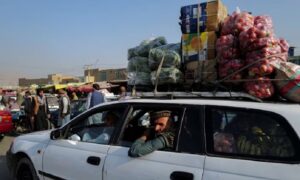 In January 2024, headline inflation experienced a significant downturn, reaching -10.2 percent on a year-on-year basis, the World Bank said in a report.
In January 2024, headline inflation experienced a significant downturn, reaching -10.2 percent on a year-on-year basis, the World Bank said in a report.
This substantial drop was largely due to a sharp decline in prices across both food and non-food categories, the report said.
Moreover, core inflation, which strips out the typically volatile food and energy sectors, also fell into negative territory, posting a rate of -6.5 percent on year-on-year basis.
“This ongoing core deflation reflects a troubling inability of both private and public sectors to stimulate sufficient demand. While this period of falling prices may offer temporary financial relief to the most vulnerable households by reducing the cost of living, it can also harm the broader macro economy,” the World Bank said.
According to the bank, Afghanistan’s exports contracted by 5 percent on year-on-year basis to $140.5 million in January 2024, down from $148.1 million the previous January.
Food exports to India jumped by 22 percent, compared to an 18 percent decline in Pakistan. Pakistan and India continued to be the top export destinations, claiming 45 percent and 34 percent of the total exports in January 2024, respectively.
The 2023 growth trend in imports extended into January 2024, hitting $830 million, up 37 percent from $600 million in January 2023.
According to the report, in 2023, the Afghani (AFN) saw a significant 27 percent appreciation against the US dollar, buoyed by the influx of around $1.8 billion in UN cash shipments and an estimated $2 billion in remittances.
Revenues have been below the de facto government of Afghanistan’s target during the first eleven months of FY2024, with border taxes underperforming despite a surge in imports.
Over the eleven-month span of FY2024, from March 22, 2023, to February 21, 2024, Afghanistan’s revenue collection reached AFN 189 billion, narrowly missing the target by 2 percent but marking a 5.6 percent increase from the previous fiscal year, the report said.
National Football Team Defeats India
 India’s Sunil Chhetri scored the first goal in the first half of the game, putting India ahead one to zero.
India’s Sunil Chhetri scored the first goal in the first half of the game, putting India ahead one to zero.
Afghanistan’s national football team on Tuesday won 2-1 against India in the return match of the preliminary games for the 2026 World Cup and the 2027 Asian Cup.
India’s Sunil Chhetri scored the first goal in the first half of the game, putting India ahead one to zero.
The students of Ashley Westwood showed a different game in the second half of this match.
The national players carried out continuous attacks with the goal of compensating for the goal and finally, Rahmat Akbari scored the equalizing goal in the 70th minute of the game.
The pressure of the country’s players on the Indians increased, and eventually a penalty was awarded in favor of the national team of the country. Sharif Mohammad converted the penalty into a goal in the 88 minute of the game.
“In the current situation and the conspiracy that was against Afghan football, we were able to achieve a victory against India with the management of the Afghan Football Federation,” said Mohammad Yousef Kargar, head of the Afghanistan Football Federation.
The victory and performance of the national team’s players led to widespread reactions on social media, and a number of well-known national athletes from various sports, especially cricketers, praised the performance of the national football team.
“We won the game 2-1 from a 0-1 situation, and we are very happy about this victory. We support the national football players. This victory is a great honor under the current conditions,” Nasser, a resident of Kabul, told TOLOnews.
The national football team is currently in third place in the group after Qatar and India with four points, and Kuwait is at the bottom of the group.
Afghan Fighter Baz Mohammad Mubariz Defeats French Opponent
 Baz Mohammad Mubariz extended his winning streak in MMA competitions. His current record is twelve wins and six losses.
Baz Mohammad Mubariz extended his winning streak in MMA competitions. His current record is twelve wins and six losses.
The competition between Mubariz and his French opponent, Johan Van de Hel, took place in the “M2MMA” organization in Ko Phuket, Thailand. Ultimately, after three rounds of competition, Mubariz succeeded in defeating his French opponent by a score difference.
This fight was in the 74kg weight class and consisted of three five-minute rounds between Baz Mohammad Mubariz and his French opponent.
With this victory, Baz Mohammad Mubariz extended his winning streak in MMA competitions. His current record is twelve wins and six losses.
Call for Restoration of At-Risk Historical Sites in Helmand
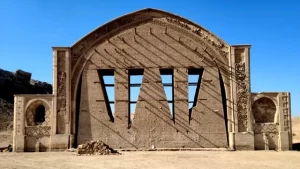 Residents of Helmand are expressing their concerns over the potential collapse of historical sites within the province.
Residents of Helmand are expressing their concerns over the potential collapse of historical sites within the province.
Residents of Helmand express concern over historical site deterioration, seek government intervention.
Residents of Helmand are expressing their concerns over the potential collapse of historical sites within the province, urging for reconstruction efforts by the interim government.
They point out that most historical sites have been put at risk of destruction due to past conflicts, natural disasters, and neglect by authorities, with Qala-e-Bost, Sultan Mahmud Ghaznavi’s palace, and the sites of Zamin Dawar, Sarawan, and Amir Kror being notable examples.
Afghanistan is culturally rich, yet due to historical conflicts, many of its historical and ancient sites across the nation have been damaged or are under threat of destruction.
Adam Khan, a resident of Helmand, told TOLOnews, “In the era of Mohammad Daoud Khan, this site attracted many tourists, and it was enjoyed by the local populace for its beauty.”
Saifuddin, another resident of Helmand, remarked, “During the previous administration, efforts to restore this historic site began but were halted again with the resurgence of conflict.”
Abdul Wahid, a resident of Helmand, stated, “Qala-e-Bost, once a beautiful site, is now ruined. It needs to be restored so tourists can visit and a positive image of this place can be portrayed.”
However, officials from the Helmand Directorate of Information and Culture have indicated that with budget allocation, they would proceed with the restoration of the province’s historical sites.
Sultan Mohammad Hanif, head of the cultural department of the Helmand Directorate of Information and Culture, commented, “We have established a protection security unit to protect encroached historical sites. So far, we have managed to liberate many historical locations from encroachment and remain committed to preserving the nation’s historical treasures into the future.”
According to the Helmand Directorate of Information and Culture, Qala-e-Bost, Sultan Mahmud’s palace, and the sites of Sarawan, Zamin Dawar, Bolan Pir Sabz, and Mukhtar are among the province’s significant historical and ancient landmarks, with some dating back thousands of years.
Artists in Herat Showcase Their Calligraphy Creations
 Early a hundred calligraphy works by various artists have been displayed at an exhibition in Herat.
Early a hundred calligraphy works by various artists have been displayed at an exhibition in Herat.
The organizers of the exhibition said that its purpose is to introduce authentic Afghan scripts and to foster the growth of art in Afghanistan.
“The goal of holding this exhibition is to introduce the calligraphy works of artists and masters to the global community and the people, to motivate artists, and enable them to work more for the advancement of art,” said Jalil Ahmad Tawana, the head of the Herat Calligraphers Association.
Verses of the Holy Quran, adorned with various beautiful scripts and embellishments, are among the works that catch every passerby’s eye at the exhibition.
Some Herat calligraphers said that for the further development of calligraphy art and the introduction of authentic Afghan scripts to the world, government support is needed.
“I must remind that not much support has been given to the art of calligraphy. This exhibition has been organized entirely with materials and tools prepared by the calligraphers themselves,” said Bismillah Soroori, a calligrapher.
“Artists, especially calligraphers, have not received the support they should have. My request from the government is to provide more support to artists,” said Ali Mohammad Saboori, another calligrapher.
According to the calligraphers, nearly ten types of scripts, including Nastaliq, Broken Nastaliq, and Naskh, have been used in their calligraphy works.
A number of cultural activists in Herat believe that the calligraphers have productive calligraphy works that can represent Afghan art on an international level.
“Each piece you see represents the future potential of artists who have endeavored in this field and have managed to pass down this art as a divine trust from generation to generation and finger to finger up to today,” said Wali Shah Bahra, a cultural activist.
Local authorities in Herat said that the government supports the art of calligraphy.
“A while ago, we invited all the calligraphers to the Ministry of Information and Culture for a meeting and consultation. We are fully supportive of these artists and collaborate with them,” said Hayatullah Mohajir Farahi, the Acting Deputy Governor of Herat.
“The plan of the Ministry of Information and Culture of the Islamic Emirate and its provincial directorates is to support artists and be their backers,” said Hamidullah Gheyasi, the Director of Art and Culture at the Herat Information and Culture Directorate.
Herat province is the birthplace of many scripts such as Nastaliq, Broken Nastaliq, Naskh, and Kufic, which flourished more during the golden age of the Timurids and have survived to this day.
Public Library Opens in Paktia
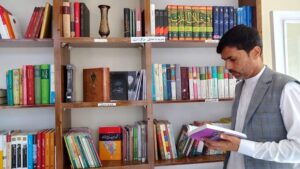 A number of educated people and writers are pleased with the opening of this library; however, they emphasize the importance of enriching its collection.
A number of educated people and writers are pleased with the opening of this library; however, they emphasize the importance of enriching its collection.
A public library has been inaugurated by the Directorate of Information and Culture in Paktia Province.
The Directorate of Information and Culture in Paktia states that the library contains thousands of books and aims to foster a culture of reading among the residents, especially the youth of the province.
Sawab Jan Islamyar, the Head of Information and Culture in Paktia, mentioned that active libraries currently exist in the districts of Zormat, Samkani, and Sayed Karam within the province, and efforts are underway to expand the number of libraries in other areas.
Islamyar stated, “Our future plan is to include religious, Islamic, and intellectual books in this library. Similarly, we aim to have books in various fields of modern sciences.”
Inamullah Salahuddin, the Deputy Governor of Paktia, said, “In the future, we plan to bring religious, intellectual, and various other types of books to the libraries.”
Residents of Paktia note that the culture of reading has diminished in recent years and request the authorities to establish public libraries in the more remote areas of the province.
A number of educated people and writers are pleased with the opening of this library; however, they emphasize the importance of enriching its collection.
Khozhman Zazai, a poet and writer from Paktia, said, “Books are very essential in life. One can progress, and if one wants to have a happy and advanced life, one should turn to books.”
Mohammad Qasem, a resident of Paktia, expressed, “Our request from the government is to create such libraries in the future for students in remote districts who have the desire to study.”
According to information from the Directorate of Information and Culture in Paktia, the foundation stone of this library was laid in the solar year 1345 (solar year), but it was destroyed and has now been reopened with a new building and an increased number of books.
Subscribe Now
Don’t miss our future updates! Get Subscribed Today!
© 2023 White Assembly. All Rights Reserved.
